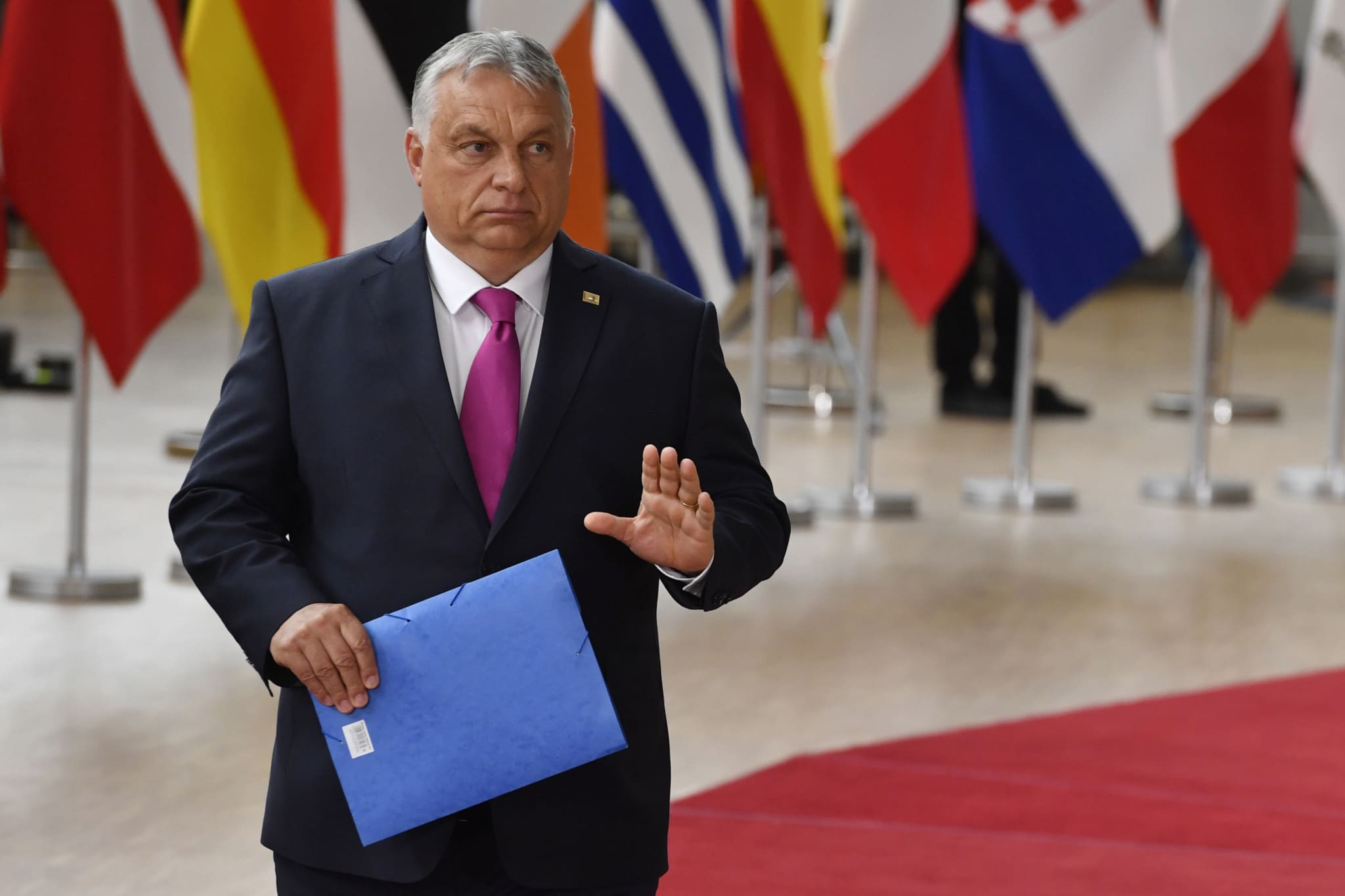Whenever Hungarian Prime Minister Victor Orbán speaks, like he did at the Tusványos Summer Open University in central Romania on Saturday, the left, both domestically and internationally, gets triggered.
But why, exactly? Aside from the thrice-elected prime minister being outspoken and conservative, what draws such widespread and passionate ire?
He’s a realist.
In last weekend’s speech, Orbán opined:
“So we have entered an age of dangers, and the pillars of Western civilization, once thought unshakable, are cracking. I will mention three such tremors causing those cracks. We used to think we were living under the protective canopy of science, but then we were hit by a certain Covid-19. We thought that there could never be war in Europe again, but now there is a war in a country neighboring Hungary. And we thought that the Cold War could never return, but now many world leaders are working on reorganizing our lives into a world of power blocs.”
Hungarian Prime Minister Victor Orbán speaking at the Tusványos Summer Open University in central Romania on SaturdayFrom far and wide, the prime minister’s critics swiftly and soundly condemned the leader’s tone as “reactionary.” Hardly.
We might argue that Orbán’s bleak assessment of Western civilization did not go far enough. In other words, the West is not crumbling but instead being chopped down at the root from several directions.
It was not modern science that let us down, but “the science,” or the politicization of the pandemic for political power. The first war in Europe for decades in Ukraine, the gatekeeper of the West, is indeed shocking, but was it inevitable?
Imagine if Afghanistan had not been so recklessly abandoned by a weak American administration, or if the addle-brained, geriatric leader of the free world had not stammered on about allowing Russia to make “small incursions” onto Ukrainian soil. Does anyone honestly think Putin would have had the temerity to launch a large-scale invasion at the backdoor of NATO nations? Would he have done so under Donald Trump?
As for Orbán’s notion of a Cold War 2.0, only the most naive, unobservant, or ideologically warped among us can deny its advent or fail to ponder its sources. A high school history student can understand that not only did the world wars almost destroy the West (the first by toppling Europe’s empires, the second by ushering in internationalism), but the only reason the Cold War ended was due to the moral clarity and firm resolve of the conservative Reagan-Thatcher-Pope John Paul II coalition, whose goal it was to obliterate Soviet communism from the face of the Earth.
What could be more accurate about the prime minister’s comments regarding world leaders “reorganizing our lives into a world of power blocs?” The World Economic Forum continuously beats the drum about a future without private property, a world without meat, and roadways filled with electric cars. The radical green movement hosts crisis summits attended by liberal jet-setters, all while it pushes a radical green agenda that would impoverish billions and tank economies.
So, yes. To ideological elites, those who live in urban echo chambers and work in air-conditioned offices in Brussels, London, and Washington, Orbán, in a similar vein to Bolsonaro, and previously Trump, seems radical, backward, and even dangerous.
Orbán’s blunt common sense disrupts the elitist’s utopian aims, and thus he must be denounced if not altogether censored, because far-left governing policies such as we have come to expect from the globalist elites on both sides of the Atlantic have spectacularly failed and are growing more unpopular by the day.
He’s pro-Western.
Possibly the section of the Hungarian leader’s speech that has been the most vociferously denounced as horrifically racist had to do with culture:
“The internationalist left employs a feint, an ideological ruse: the claim – their claim – that Europe by its very nature is populated by peoples of mixed race. This is a historical and semantic sleight of hand, because it conflates two different things. There is a world in which European peoples are mixed together with those arriving from outside Europe. Now that is a mixed-race world. And there is our world, where people from within Europe mix with one another, move around, work, and relocate. So, for example, in the Carpathian Basin we are not mixed-race: we are simply a mixture of peoples living in our own European homeland. And, given a favorable alignment of stars and a following wind, these peoples merge together in a kind of Hungaro-Pannonian sauce, creating their own new European culture.”
Hungarian Prime Minister Victor Orbán speaking at the Tusványos Summer Open University in central Romania on SaturdayDid the prime minister suggest that his nation or even Europe promotes racist policies against Muslims or Jews? No, he knows his history: The “ideological ruse,” the “historical and semantic sleight of hand” he refers to, is spot on. Globalist elites envisage a world in which a strong West centered on solid nation-states cooperating for peace and prosperity is a thing of the past. The two main aims of the world’s elite ruling class, consolidating power and making money, require at least two things. First, the continent’s nations must lose as much of their sovereignty as possible. Second, Western civilization’s socio-historical backbone — the meshing of Greek philosophy, Roman law, and Christian ethics — must be downplayed or (better yet) wholly forgotten.
It is a great embarrassment to elites that Europe is, historically, nationalist and Christian. They dream of a New Europe free of national boundaries, and centered on the new secular religion of diversity, equity, and inclusion.
What better way to reach their goal than to ostracize a nation like Hungary that proudly celebrates its 1,000+ years of Christian identity, and its brave survival in the face of hundreds of years of foreign occupation and oppression?
He’s powerful
It might sound odd to say that a prime minister of a small, landlocked, former-communist Central European country is powerful, but he is. Morally speaking. In fact, he is a downright threat to his political enemies.
Orbán finished his speech with this cutting insight that illustrates the point:
“Historically the Americans have had the ability to pick out what they identify as an evil empire and to call on the world to stand on the right side of history – a phrase which bothers us a little, as this is what the communists always said. This ability that the Americans used to have of getting everyone on the right side of the world and of history, and then the world obeying them, is something which has now disappeared.”
Hungarian Prime Minister Victor Orbán speaking at the Tusványos Summer Open University in central Romania on SaturdaySpot on. Gone are the days of the American moral clarity and strength that won the Cold War, which oppressed millions of Central and Eastern Europeans. America today is stuck in a suicidal struggle session in which every historical failure is fatal and every moral accomplishment disregarded. As our ruling elites look for systemic racism in the nation’s schools, oppressive structures in every institution, and bigotry in every American heart, the world looks on in dismay.
We hope and pray that America will find her moral courage and lead once again. But for now, the most realistic, sensible, and morally clear voices are coming from places like Poland, Brazil, and yes, Hungary.
We don’t have to agree with every word that comes out of Victor Orbán’s mouth, enjoy his style, or even want to live in his country, but the triggering that happens in the leftist echo chamber when he speaks to an audience in his own country on a sunny afternoon in July says much less about him than it does those who would denounce him.
Kelli Buzzard is a U.S. scholar and Research Fellow at the Mathias Corvinus Collegium. Her research topic is, “Preserving Hungarian Identity and Culture.“





